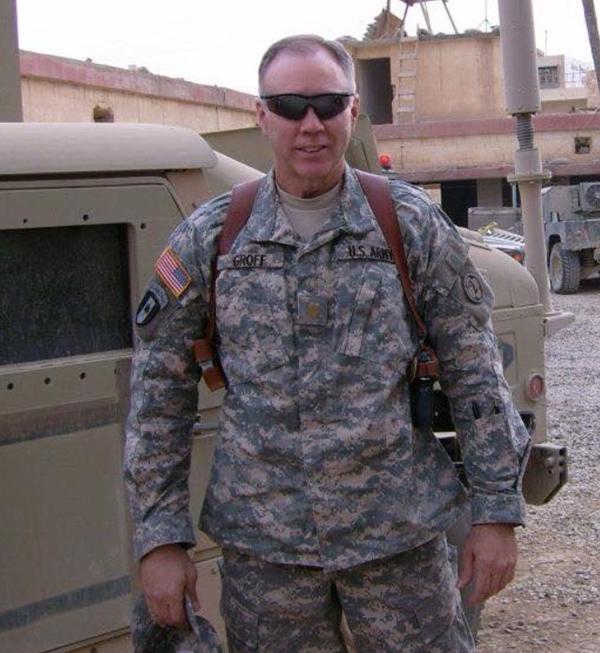Groff has had a distinguished career in the military, serving as a captain in Operation Desert Storm. Later, in 2006, he served as an army psychologist in Iraq, where he ran a combat stress management team.
During his tenure in the military, Groff had to make several decisions when evaluating soldiers. If he thought a soldier was suicidal or homicidal, he had to take their weapons away. He also had to decide whether a soldier was fit to serve.
“The hardest, most difficult thing is returning someone to duty – and knowing you’re going to put them in harm’s way,” he said.
Groff stepped into the world of theater when a girl he was dating wanted to try out for a part in “The Sound of Music.” He agreed to audition with her for moral support and was cast in the chorus. A few years later, after moving to New York, he auditioned for a role in the Broadway musical “Grease.”
“I didn’t even know it was Broadway. That’s how naive I was,” he said.
Over 450 people auditioned that day, but Groff said he later realized it was a nation-wide audition that drew more than 2,200 people. He eventually landed the role of Vince and toured for 10 months nation-wide before being offered to do the Broadway show, where he became friends with then up-and-coming star, Patrick Swayze.
“[Swayze] was such a great guy and a terrific actor” Groff said. “He would always break up on stage,” .
Groff said he ultimately decided to leave the theater business because he wanted a more stable job for his wife and daughters.
“I just didn’t want to have the uncertainty of being a parent, raising kids and not having a steady job,” he said. “You make a lot of money, but then you make no money for a long time.”
He currently works as a psychology professor at the University, teaching 45 students in an Introduction to Psychology course.
Emma Duncan, a sophomore majoring in biology, said Groff makes her 8 a.m. class interesting and fun. She said he always has interesting stories to tell the class and helps relate what they’re learning about to real life.
“Recently we’ve been talking about the basics of psychology,” she said. “[Groff] eases into it. He’s a really good story teller.”
When working at the VA Medical Center, Groff faces the effects of war and has dealt with many soldiers suffering from the effects of post- traumatic stress disorder. He said soldiers reject the reality of horrible situations while fighting overseas in order to survive, but the horrors of war strike them when they come back home.
“When you come back to the United States, everything you’ve experienced just seems to blow up,” he said. “Now, you realize, ‘I’m safe. I don’t have to hold it in any longer.’ It’s once they get out of that combat zone that everything starts to spill out.”
He recalled a 94-year-old World War II veteran suffering from dementia who couldn’t remember his wife’s name or even his own birthday.
“He said, ‘I was carrying a 30-caliber machine gun. I can still see the tracer rounds going downhill, and the Japs firing back at us,’” Groff said. “How sad – the things this guy wants to remember, he can’t, and the things he don’t want to remember, he can.”
Cathy Hallman, a recently retired administrative coordinator at the Medical Center, said Groff works well with the veterans coming into the facility. She said he knows how to find a common ground between himself and others and can make even the most closed-off person open up.
He said he hasn’t completely forgotten his theater roots and pushed for a play to be performed for the veterans at the VA, honoring them around Veteran’s Day, Hallman said.
“[Groff] thought it would be fun,” Hallman said. “He got the different departments involved, and it was a lot of fun. It was very professional, top notch, and it was just like being on Broadway. He was really the pivotal point in making it a reality.”









